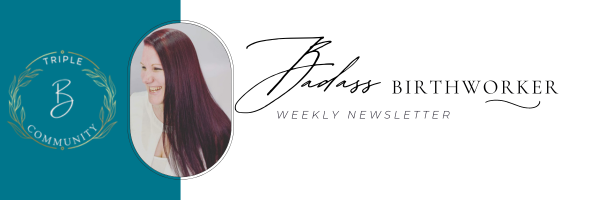|
Over the last five years the demand for doula services has increased considerably, in large part due to expanding awareness of the benefits of doulas. Demand has also increased because of healthcare coverage and the ability of doulas to reduce costs associated with pregnancy and birth. While doulaing may seem like a new trend, all ancient societies had a version of what we know in modern day to be a doula.
When looking for a training, many are overwhelmed with the amount of different doula trainings to choose from. It is important to do your research and find a program that aligns with your own birthwork philosophies and what you are wanting to do with your training. As a birth professional of over ten years, I’ve done many basic and advance birth professional trainings. Just as every doula is not a match for every person, every doula training program is not a match for every person. What works for a friend may not be what works best for you. Here are 9 things to consider when researching a doula training program:
What is your Driving Why? We, as birth professionals, have all kinds of reasons for getting into birth work. It can be because of our own personal birth experiences, the desire to become an independent business owner, or to advance a career we already have. Are you looking to supplement income? Are you wanting to give back to the community? Are you looking for a stepping stone to becoming a midwife? Know what the reason, it is important for us each to know the why behind our actions. Being clear on our why can help you decide what program is best aligned to meet those needs. What kind of knowledge will you walk away with? Each program and each individual trainer has a personalized training. Know what the curriculum includes. For example, DONA approved programs meet DONA’s core curriculum and likely has additional hours of education based on the specific trainer. This means each DONA training program is different based on who the trainer is. Online only programs such as Bebo Mia or Madriella will be the same since they are offered directly through the organization and will not vary based on individual trainers. Some programs are based out of other countries. Is the training relevant to where you plan to practice? Depending on why you are looking for the training will determine the needs of the curriculum. A person with no birth knowledge will be different than someone with 10 births already in their experience. Are you planning to work in hospitals or more aimed at attending out-of-hospital births? Are you wanting a basic birth doula training or a training that also includes birth, postpartum, bereavement, and childbirth educator training in one like the BABES doula program? There are also programs like Maternal Health Specialist that offer doula training as well as birth assistant and lactation. Does the organization offer additional advanced trainings that you may take at a later time to add skillsets or education to your experience? Do they have business training? My first doula training lacked adequate business skills training. The business section was a few bullet points and the back of the manual about making rack cards for OB offices and not much more. Many new doulas don’t realize as soon as they start offering services they are the proud new owner of their own business as an entrepreneur. This includes many things a regular employee does not have to deal with like marketing, self-employment taxes, client acquisition protocols, and the legality of registering your business and its business structure. It is important for a doula to know what the foundations of business owning are and how to navigate them as they are related to a birth business. Do they teach website design, how to write a business plan or financial forecasting? It can be extremely helpful to select a program that includes specialized business training for birth professionals. How is the training delivered? Is the program delivered in-person or online? Do they have an in-person option with hands on activities? Does the program include live video sessions online or do they give you PDFs to read? Are there interactive activities or a workbook to go through? Many programs today offer online options. Not all online options are created equal. I once did a doula training online in which I was provided only PDFs to read and nothing more. While there was some good information to read, it would have set me up to be woefully under prepared for the task of being a doula. Taking an in person training is wonderful, especially if they have hands on skills you can practice. Though if it does not come with a supplementary manual or additional information a two day training would be hard to base an entire business upon. Being able to go back to your reference material and look up information is important to the quality of the education. After 10 years, I still learn new things about the birth profession. It is an ongoing process. There is no way to fit the breadth of doula knowledge and skills into a weekend workshop. Even if you are the best notetaker, there will be pieces of information you may forget and want to come back to after the workshop. The manual I received from my first doula training was more of a reference guide to the slide show that was presented. It had a general overview with a lot of bullet points. It did not provide me with a comprehensive manual to go back to and reference items if I wanted more information on from a reliable source. In the end you should pick a program that delivers you with ample options for learning that fits with your resources. If you are unable to travel for a workshop do they offer the option of hosting in your area? Do they offer a workshop you can attend at a later date that fits with your lifestyle or a hand on skills session? How much is the training? While price should not be your top motivating factor for choosing a program, we have to acknowledge finance are a factor to be considered. The price ranges for doula training go from a few hundred to over a thousand. What is your budget? Look for a program that offers the most value for what the training provides. If you choose the cheapest program does it meet all your needs or will you end up spending more for business training or postpartum training? Does the program offer payment plans if you need it? Does the program offer scholarships? Is the cost of training all-inclusive or are there other fees associated with the training like recertification fees or application fees? What other costs are required for the training (books, travel, CPR, insurance, ongoing membership)? Keep in mind, the cost of the program is an investment in yourself and in your business. You can often write off all or a portion of your training and supplies on your tax expenses. The average cost of a doula is $600-$800, depending on your location. In bigger cities the average cost can go up to $1200-$1500. This means you can recoup the cost of most trainings with one or two full paying clients. What is the birthwork philosophies of the organization and/or the trainer? The core values of the organization and/or the trainer will be heavily reflected in the organizations teachings. Do you desire an organization that reflects your religious values or emphasizes the importance of bereavement training? Is advocacy or spirituality a core premise of what you want in a training? Are the use of gender neutral terms in the curriculum a must have for your birth philosophy? Does the organization support herbal products or focus on medications? Make sure both the organization and/or trainer philosophies match with your own. If you are unsure what make up your core philosophies take some time and brainstorm it before making a choice. What does the organization do to give back to the birthing community? Do they have scholarship funds? Do they contribute to fundraisers to help with birth related causes you are passionate about? Do they collaborate with other organizations who are pushing better birth outcomes or getting more birth professionals to those in need? Does the organization offer a certification process? What are the requirements for certification? As an unregulated profession certification is not required to offer doula services. Some organizations offer what they call a certification just for completing their training, but a certification process should entail a process by which the organization can confirm competency regarding core knowledge of a doula and continuing education. If the organization offers a certification pathway, what variety of educational and clinical experience is required? Do they require references or essays? Is certification a requirement to work at your local hospital or birth center? Does your state reimburse for insurance or Medicaid for certain certification programs? How long do you have to complete the certification requirements? How do the certification requirements compare to other organizations? You may take a training and choose not to certify through an organization. Are there restrictions does the training or certification program? Many organizations take a strong stance on specific subjects and require their doulas using their name to comply with these restrictions. This can include like attending an unassisted birth, the use of essential oils, what you charge clients, or how old you must be. Research restrictions of each organization and make sure you are okay with abiding by such restrictions. Also note on whether the organization requires ongoing membership with the organization to be one of their doulas and if this is a right fit for you. Are restrictions true restrictions on which a revocation of your certification will occur or is it a strong recommendation? Does the organization offer ongoing support to their doulas? Some training program support ends after the training or certification process or can be difficult to get any help after this time period. Some programs offer ongoing mentorship or ongoing additional training. Does the organization offer debriefing services after a complicated or traumatic birth? What kind of ongoing support are you looking for or anticipate having? Do you have to pay for ongoing support or mentorship? Do they offer a community based support group like a private Facebook members group? Our biggest tip is to take your time in deciding. Do your research and make sure the program is truly a good fit for you. If you are looking for a quick comparison here is a guide for some of the doula organizations out there.
1 Comment
|
Details
Archives
May 2024
Categories
All
|



 RSS Feed
RSS Feed